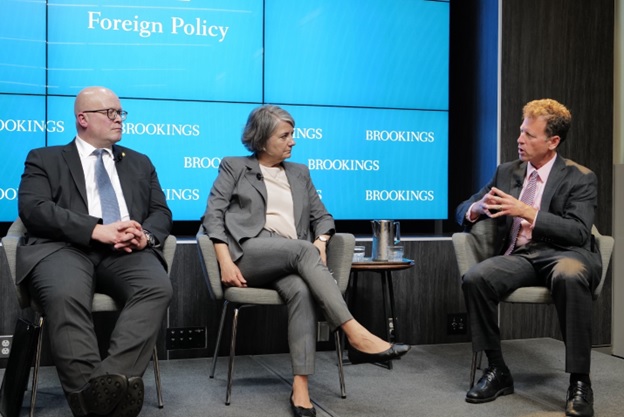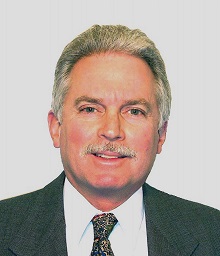
Fast-Track to NATO Expansion Hits a Speed Bump
By Phil Pasquini

Washington: Brookings, a think tank founded in 1916, presented a timely discussion on May 23, titled “ Finland, Sweden, and the future of NATO.”
Discussing the urgent need to join NATO were Finnish ambassador to the US, Mikko Hautala, and the Swedish ambassador to the US, Karin Olofsdotter. The two ambassadors appeared in the wake of last week’s official state visit by their respective leaders, Finland President Sauli Niinisto and Sweden’s PM Magdalena Andersson, who met with President Biden to present their case for fast-track membership into the organization. In the aftermath of the meeting, Biden announced his strong support for their inclusion and was reported to have forwarded the necessary paperwork for their membership to the Senate where it has bi-partisan support.
Putin’s invasion into Ukraine has changed the security perspective for all of Europe dramatically and as such induced both countries with a sense of urgency to join NATO as a hedge against his ambitious plans to reconstruct a Soviet Union 2.0 and against his eyeing of Europe for further expansion into his orbit. The two formerly non-aligned nations applied for membership on May 18 th in what they hope will be a fast-tracked approval.
When answering a question why both countries have reversed course from non-alignment and are now applying for membership, the ambassadors responded individually. Swedish Ambassador Karin Olofsdotter went on to say that as early as last year she was concerned with the US focus on China and was “a little bit worried that you would not focus on European security as maybe we would like. I think that when the attack (Ukraine) really came, that changed it for us because we saw the brutality and we saw that it completely changed the European Security architecture forever.” And that was the pivotal event that prompted Sweden to seek membership.
Finish Ambassador Hautala said his country decided to seek membership in NATO by citing three reasons for their decision. He indicated that Putin, who had a hands-off policy towards NATO membership with Finland, Sweden, and others, redefined the European security order in December 2021 that would have left them “…permanently outside of NATO and outside of NATO for us means that you are in their sphere of influence.” Previously Putin had left them with the impression he said that they had a “free choice in the matter.” Now he was trying to deny that and that was “…kind of the first shock.” Second, the attack (Ukraine) in February was “kind of a trigger” that prompted them to seek membership. “The third reason is that the attack caused them to understand that if that was not the change they long considered” to seek membership, then nothing would bring about a decision moving forward.
The only NATO member to object to the applications was Turkey whose President Recep Tayyip Erdogan blocked an effort to allow talks on swift ascension for both countries into the organization based on his objections that both Finland and Sweden support “terrorist” organizations hostile to the Turkish state. Turkey has had issues with both Sweden and Finland in the past over Erdogan’s claim that both countries are insensitive to issues regarding terrorism and the war in Syria.
A Turkish official did later clarify that, before they would relinquish their objections for talks, there must first be an agreement. To gain such support, under NATO’s founding charter (1949) Article 10, any new aspirant(s) must be approved by “unanimous agreement” of all thirty member states. NATO’s “Open door policy” allows any member state to require certain criteria be met before the aspirant gains their support.
Speaking on Turkey’s objection, Ambassador Hautala said, “Obviously, on the end game, I don’t think anybody knows how it will play out. We have to focus on what we are actually talking about. I think there are certain items including political issues, terrorism issues and armed sales issues. I would simply say that there are simply things that could be done.” Since the matter is yet to be worked out, he only indicated that “Finland would remain Finland” and that there were some areas that would not be negotiable in arriving at a final agreement with Turkey to gain their support. Swedish Ambassador Karin Olofsdotter also agreed with his summary.
One of Putin’s stated objectives for his invasion of Ukraine, among others, was in keeping NATO from entering Russia’s sphere of influence through the addition of new members from countries bordering Russia. That effort has failed miserably and has instead resulted in strengthening the entire security alliance as a result with others now hoping to join the organization as well.
Not everyone is delighted to see the further expansion of NATO. Anti-war groups around the globe have demonstrated in calling for an end to NATO expansion and worry about antagonizing Putin further with the very real possibility that expansion could cause an escalation and aggrandizement of the war. Their concerns are shared by many others including some governments who view the organization as another form of American hegemony. Others view NATO as an existential threat by its very existence to Russia and cannot fathom why the West is so in denial of that imperilment.
Historically, Americans need only to look at the Cuban Missile Crisis of the Cold War era to understand what a new nuclear armed military actor in your neighborhood does to threaten a nation’s security interests.
George Washington who in his farewell address at the end of his second term as president in 1796 said in hoping to impart some good advice and in promoting peace, “Observe good faith with all nations. Cultivate peace and harmony with all.” Great as this advice is, it’s even harder to establish and maintain in today’s complicated and fast-changing world.
(Phil Pasquini is a freelance journalist and photographer. His reports and photographs appear in the Washington Report on Middle East Affairs and Nuze.ink. He is the author of Domes, Arches and Minarets: A History of Islamic-Inspired Buildings in America.)

